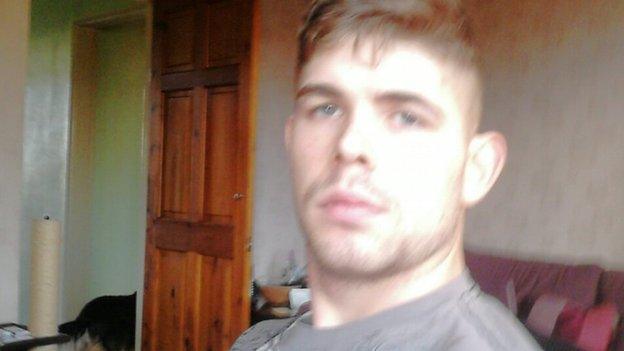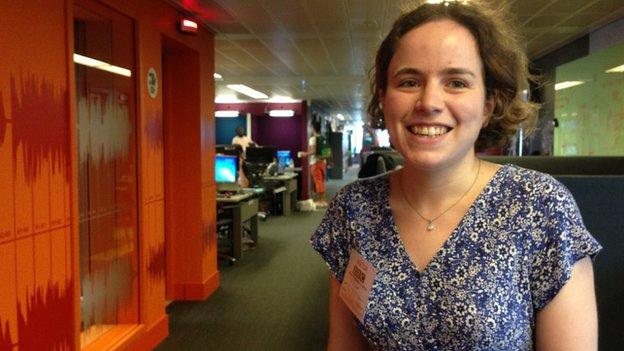Head to head on the right to die or assisted dying
- Published

Josh supports the idea of assisted dying
The right to die is back in the headlines as plans are put forward for a new law on assisted dying.
The Prime Minister doesn't think it's necessary but the House of Lords will discuss it on Friday.
It comes after former Archbishop of Canterbury, Lord Carey, said he'd changed his mind and now supports the changes.
But current Archbishop Justin Welby disagrees.
What is being suggested?
- A law for England and Wales which would allow a doctor to give a life-ending drug dose to people with less than six months to live.
- Two independent doctors would have to agree to it
- The patient would take the medication themselves at a time of their choice - it wouldn't be administered by a doctor.
What's the law at the moment?
- It's illegal in England and Wales to take someone's life or help them do so to relieve suffering.
- There's a similar law in Northern Ireland.
- It's less clear cut in Scotland with no specific law, but someone could be prosecuted for homicide.
There have been several previous attempts to change the law, and some families have taken their own personal cases through the courts.
Meet Josh and Hannah
Newsbeat asked Josh, who has Huntingdon's Disease and supports assisted dying, to compare his experiences with Hannah, who suffers inflammatory bowel disease (IBD) and associated arthritis, and is against the idea.
Josh
I'm 23 years old now, but at 18 I took the step to get tested for Huntington's Disease, which is a genetic illness that can be passed down from a parent. My Mum has the disease and so did my great grandma.
At some point in my 50s I will lose control of my muscles and the ability to walk and talk. I will not be able to remember simple things like my best friends' faces.
It's basically a 10 to 15-year decline where you lose everything. You become a shell of what you were, like my great grandma did. She was stuck in a chair, twitching and choking to death on her own saliva.
I have grown up my whole life basically knowing what's going to kill me. My problem is I do not want to go through those 15 years where everyone is just going to see me as that "ill bloke".

Plans are being put forward for a new law on assisted dying, but Hannah, who has crohn's disease, is against them
Hannah
I started suffering from chronic back pain when I was 12 and that was accompanied with symptoms of diarrhoea and pain in my abdomen.
It's been a long journey getting a diagnosis, so I have been in pain on and off for the last 10 years and pretty much constantly for the last three or four.
I have now been diagnosed with inflammatory bowel disease (IBD) and associated arthritis.
What I'm looking at is a period of relapse and remission, but also a gradual decline towards needing surgery and restricted mobility. I can imagine I will need a wheelchair. At the moment I use sticks to walk.
The bowel symptoms are quite distressing and debilitating, I can be on the toilet up to 15 times a day and that has complications in terms of dehydration and fatigue.
I'm not lacking in compassion towards people like Josh. I have been there in hospital... I was at a stage where I just thought 'I'm in too much pain, I can't go on with this, I want to end it all.'
Head to head
Josh first explained to Hannah why he was in favour of a potential new bill.
He said: "I think it's one of the first proper steps forward this country has taken in decades."
"This is a step finally towards giving people like me, my mum and countless others that are in our situation control and compassion from our fellow man at the end of our lives.
"It would mean we could take a tiny bit of control back and say, 'No this is my time to go'. I don't want to have to put everyone I know and myself through this suffering."
However, Hannah is worried.
"My concern about this bill is that it could start quite specific, but it then may widen to a larger group of people," she explained.
"People may end up thinking, 'I should go, I'm going to be a burden on my family. It's right for me to die', when actually they could have a lot to contribute."
Josh Cook talks about living with Huntington's disease
Josh pointed out to Hannah that in countries like Switzerland where assisted dying is legal people who are in these situations live for longer because "they know they have the option to say, 'This is enough now'."
But Hannah is not convinced and said: "There are surveys that suggest 61% who ended their owns lives under that law did so because they felt like they were a burden on their friends and family."
Josh admits when it gets to the stage where he cannot walk or talk he will "feel like a burden", but insists that is not what legalising assisted dying would be about.
"We're not saying, 'If you feel like that now, you should go'. We want people to push through as far as they can.
"But when you turn around and you make that decision for yourself that you can't go on, this law would mean no-one could stop you and say, 'No, you can't do that, you're breaking the law'."
However, Hannah still has a lot of concerns about the far-reaching implications this could have in the future.
"Already society puts a lot of pressure on disabled people and chronically ill people," she said. "My fear is that increasingly it will become in the public consciousness that disabled people are a burden and they should just end their lives.
"Once we open this door it's going to be easier for people to put their foot in and wedge it wider. We will end up with more and more people feeling burdensome and that this is their only option and that really worries me."
Follow @BBCNewsbeat, external on Twitter and Radio1Newsbeat, external on YouTube